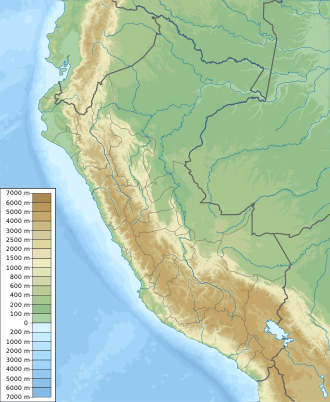Pagaibamba Protection Forest
| Pagaibamba Protection Forest | |
|---|---|
| Bosque de Protección Pagaibamba | |
IUCN category VI (protected area with sustainable use of natural resources) | |
 Waterfall inside Pagaibamba Protection Forest | |
| Location | Cajamarca |
| Coordinates | 6°24′53″S 79°04′03″W / 6.4147°S 79.0675°W |
| Area | 8.0247 sq mi (20.784 km2) |
| Established | June 19, 1987 |
| Governing body | SERNANP |
| Website | Bosque de Protección Pagaibamba |
Pagaibamba Protection Forest is a protected natural area in the region of Cajamarca, Peru.[1] The area was declared a protection forest in order to preserve the water supply of surrounding towns, preserve the water cycle of the area, protect road infrastructure and protection of soils by preventing erosion.[1][2]
History
[edit]The Pagaibamba Protection Forest was established on June 19, 1987.[1]
Geography
[edit]This protection forest is located in the district of Querocoto, Chota Province, Cajamarca.[1][2] It covers an extension of 2,078.38 hectares (8.0247 sq mi) and protects a mountainous area dissected by small creeks.[1] Elevations in the area are between 2300 and 2800 m.[3]
Climate
[edit]Mean annual temperatures have a maximum of 10,9 °C and a minimum of 6,5 °C.[1] The annual average precipitation has a maximum of 1,722 mm and a minimum of 834 mm.[1]
Ecology
[edit]Flora
[edit]According to the Holdridge life zones classification, the vegetation type is a wet tropical mountain forest.[1] Among the plant species reported in the area are: saucecillo (Podocarpus sp.), roble amarillo (Ocotea sp.), lanche (Myrcianthes sp.), suro (Chusquea sp.), queñual (Polylepis sp.), aliso (Alnus acuminata), palm trees, tree ferns, etc.; growing in association with tall grasses.[1][2]
Fauna
[edit]Mammals reported in the forest include: the spectacled bear, the puma, the white-tailed deer, the Andean fox, the montane guinea pig, the mountain tapir, the tapeti, the pacarana, etc.[1][2][4] The rodent Thomasomys pagaibambensis is only known from the forest.[5]
Among the birds present in the area are: the razor-billed curassow, the Andean guan, the Andean condor, etc.[1][2]
The frog Pristimantis chimu is reported in this area.[6]
Activities
[edit]Nature watching, trekking and scientific research are the main activities in the area.[1][2][4]
Environmental issues
[edit]Deforestation is threatening the forest's area of extension.[2] In late 2016, Pagaibamba was one of several protected areas in northern Peru affected by human-caused wildfires.[7][8][9] These fires were caused by slash-and-burn agricultural practices that went out of control coupled with drought.[7][8] The burning of forests to open land for crops is considered illegal in Peru.[7]
References
[edit]- ^ a b c d e f g h i j k l "De Pagaibamba – Servicio Nacional de Áreas Naturales Protegidas por el Estado". www.sernanp.gob.pe (in European Spanish). Retrieved 2017-05-11.
- ^ a b c d e f g "BOSQUE DE PROTECCIÓN DE PAGAIBAMBA" (in Spanish). MINCETUR. Archived from the original on 2017-07-28. Retrieved 2017-05-11.
- ^ Weigend, Maximilian; Rodríguez, Eric; Arana, César (2005). "Los bosque relictos del noroeste de Perú y del suroreste de Ecuador". Revista Peruana de Biología. 12 (2): 189. doi:10.15381/rpb.v12i2.2390.
- ^ a b Jiménez, Carlos F.; Quintana, Heidi; Pacheco, Víctor; Melton, Derek; Torrealva, Javier; Tello, Guillermo (2010). "Camera trap survey of medium and large mammals in a montane rainforest of northern Peru". Revista Peruana de Biología. 17 (2): 191–196. doi:10.15381/rpb.v17i2.27. ISSN 1727-9933.
- ^ Pacheco, Víctor Raul; Ruelas, Dennisse (2023-06-21). "Systematic revision of Thomasomys cinereus (Rodentia: Cricetidae: Sigmodontinae) from northern Peru and southern Ecuador, with descriptions of three new species". Bulletin of the American Museum of Natural History. 461: 1–72. doi:10.1206/0003-0090.461.1.1.
- ^ Venegas, Pablo J.; Duellman, William E. (2012-03-28). "Two syntopic new species of the Pristimantis orestes Group (Anura: Strabomantidae) from northwestern Peru". Zootaxa. 3249 (1): 47–59. doi:10.11646/zootaxa.3249.1.5. ISSN 1175-5334.
APPENDIX. Specimens examined. Pristimantis chimu: PERU: Cajamarca: Bosque de Protección de Pagaibamba, 3000 m
[dead link] - ^ a b c "'Out of control' wildfires damage protected areas in northern Peru". Mongabay Environmental News. 2017-01-17. Retrieved 2018-10-27.
- ^ a b "MAAP #52: Update – Fires Degrade 11 Protected Areas in northern Peru". MAAP. 2017-01-11. Retrieved 2018-10-27.
- ^ "Forest fires affecting 10 regions, 4 natural zones in Peru". Fox News Latino. 2016-11-23. Retrieved 2018-10-27.

